When should I inject EpiPen®?
Inject EpiPen® at the first sign or symptom of a severe allergic response to a known or suspected allergen. Severe allergic reactions are not always predictable. Obvious warning signs are not always present before serious reactions occur.
Talk to your doctor if you have a history of severe cardiovascular collapse from exposure to an allergen. They may advise you to inject EpiPen® immediately after exposure, before any reaction has begun.
EpiPen®, when used as directed immediately following exposure to a known allergen, may prove life-saving.
How do I use EpiPen®?
EpiPen® is injected through a simple 2-step process:
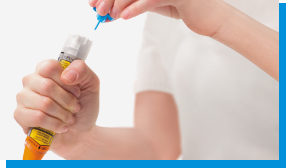
Blue to the sky.
- Grasp with orange tip pointing downward
- Remove blue safety cap by pulling straight up — do not bend or twist
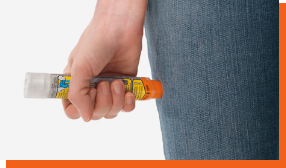
Orange to the thigh.
- Place the orange tip against the middle of the outer thigh.
- Push hard against the leg until you hear a pop, which signals that the injection has started.
- Hold firmly in place for three seconds (count slowly, “1, 2, 3”).
What should I do after using EpiPen®?
- Call 911 or go to the emergency room immediately. The effects of epinephrine can wear off, or you could have a second reaction.
Using EpiPen® does not replace seeing a doctor or going to the hospital.
- Give any used EpiPen® auto-injectors to emergency responders or emergency room personnel to discard.
Find these instructions on the barrel of your EpiPen® auto-injector or in your Consumer Information Leaflet.
How many seconds should I hold EpiPen® in place when I inject?
Hold EpiPen® firmly in place for three seconds (count slowly, “1, 2, 3”). This helps to properly deliver your dose of epinephrine.
How do I know if my EpiPen® auto-injector has been activated or if I have received my injection?
- After you remove EpiPen® from your thigh, the orange needle cover will be extended and locked in place.
- A used EpiPen® and its extended needle cover will not fit into the carrier tube.
- Give any used EpiPen® or EpiPen Jr® to emergency responders or emergency room personnel.
Can I inject EpiPen® through my clothes?
Yes. If necessary, you can inject EpiPen® through clothing.
What do I do If I accidentally inject EpiPen® into my hand or foot?
Accidental injection into the hands or feet may result in loss of blood flow to the affected areas and should be avoided.
If you accidentally inject EpiPen® into these areas, go to the nearest emergency room immediately for treatment.
How should I dispose a used EpiPen®?
After using EpiPen®, seek medical attention, and give any used EpiPen® auto-injectors to emergency responders or emergency room personnel to discard.
For an expired EpiPen®, contact your local pharmacy to assist in disposing of the device according to regulations.
What should I do if I accidentally remove the blue safety cap from EpiPen®?
Removing the blue safety cap prepares EpiPen® for activation.
If your EpiPen® Auto-injector has not been activated (i.e, pressed against your thigh), then you can carefully replace the blue safety cap:
- Keep your fingers away from the orange tip.
- Always keep your EpiPen® or EpiPen Jr® in the carrier tube to protect it from damage; however, the carrier tube is not waterproof.
- The blue safety top helps to prevent accidental injection. Keep the blue safety top on until you need to use EpiPen® or EpiPen Jr®.
Do I have to be certified to administer EpiPen® to someone else who is in need of the medication but unable to administer it themselves?
Emergency administration of EpiPen® in the case of a suspected severe allergic reaction does not require certification. Your physician or pharmacist should review the package insert in detail with you or your caregiver to ensure you understand what EpiPen® is for and how to use it.
Actual demonstration of the injection technique by a physician or pharmacist is recommended.
Get your free EpiPen® Training Kit to help you, family, and friends practice how to use EpiPen®.
What are the dosage strengths of EpiPen®?
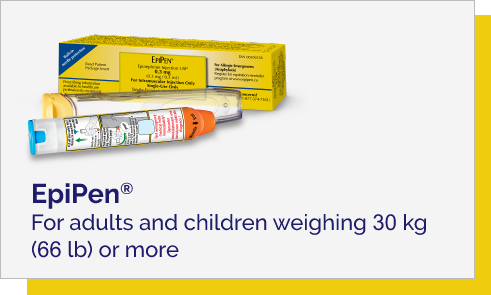
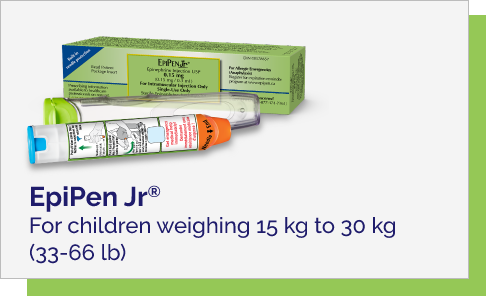
For children weighing less than 15 kg, call 911.
How many doses of EpiPen® can be administered?
If you or your child do not feel better or get worse, you can inject another dose of EpiPen® or EpiPen Jr® 5 to 15 minutes after the first injection.
Do not inject more than 2 injections right after each other.
Too much epinephrine can cause dangerously high blood pressure, stroke, or death. Signs of an overdose include:
- Irregular heart beat
- Difficulty breathing caused by a build-up of fluid in your lungs
Call 911 or go to the emergency room immediately after using EpiPen® or EpiPen Jr®.
Even if you have sought medical help, stay in close proximity to a hospital or where you can easily call 911 for the next 48 hours.
How do I read the expiry date on EpiPen®?
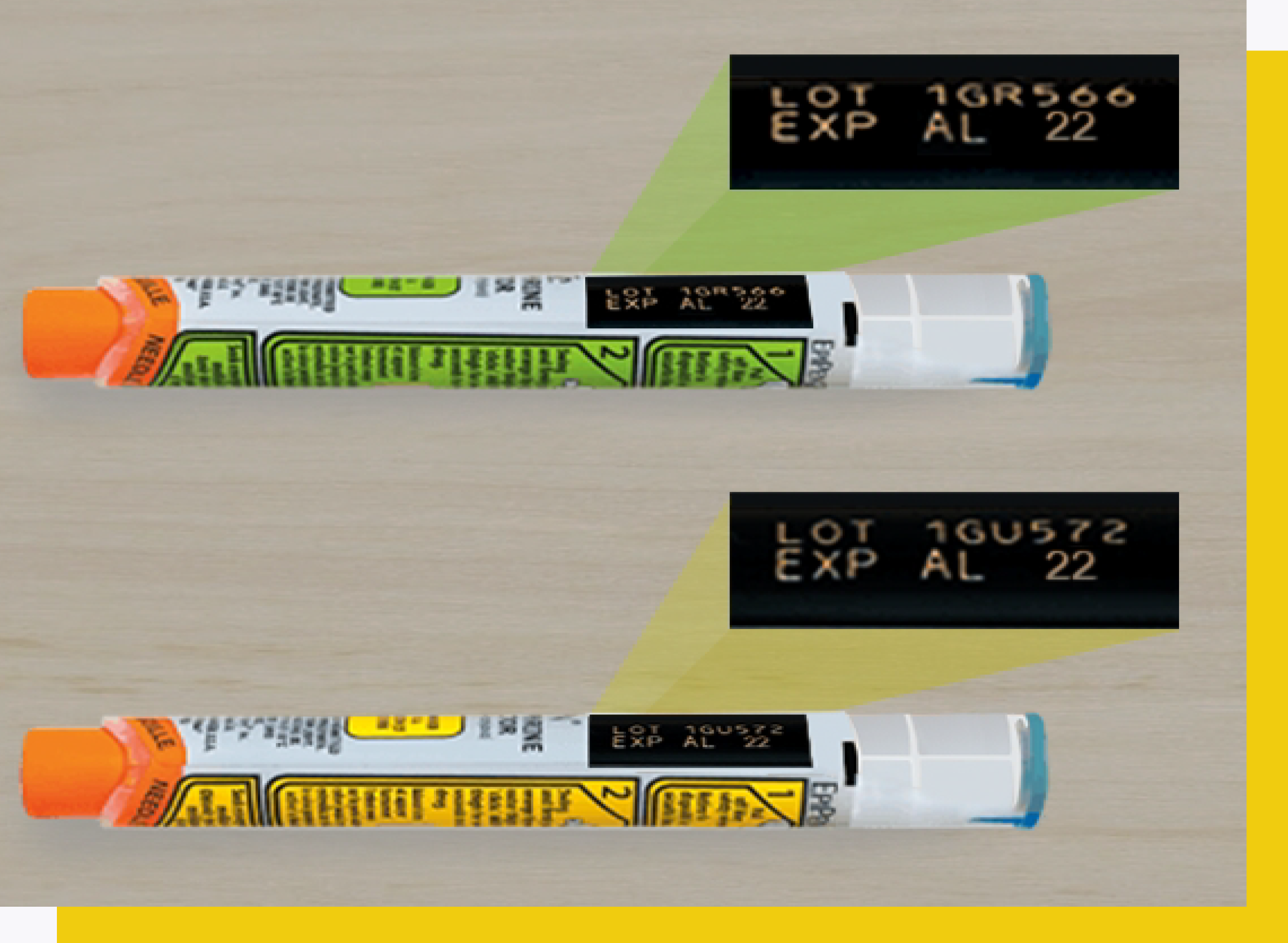
The expiration date is expressed as the month and the last 2 digits of the year. For example, an expiration designation of “Exp: JA 19” indicates that the EpiPen® Auto-Injector expires the last day (31st) of January 2019, thus the expiration date in this example would be January 31, 2019.
Note: Expiration dates on EpiPen® from Canada are different from the U.S. The Canadian product is designed to be "bilingual friendly" (e.g., JA = January, MR = March, MA = May).
Each new EpiPen® should have a minimum of 12 months before expiry. If you recently bought an EpiPen® or EpiPen Jr® auto-injector that has a shorter expiry date, please talk to your pharmacist.
How do I store EpiPen®?
Storing your EpiPen® auto-injector properly can keep it effective and ready to use in the event of a severe allergic reaction:
- Keep your EpiPen® auto-injector at room temperature (15-30°C).
- Do not refrigerate or freeze
- Do not expose to direct sunlight
- Do not keep EpiPen® in a vehicle during extremely hot or cold weather
- Keep your EpiPen® auto-injector in its carrier tube to protect it from damage; but remember, the carrier tube is not waterproof
- Keep the blue safety cap, which helps prevent accidental injection, on until you need to use EpiPen®
- Do not drop your EpiPen® auto-injector
- Do not keep folded paper instructions or any other objects in the carrier tube with EpiPen®; they may prevent you from retrieving your auto-injector quickly in a severe allergic emergency
Occasionally inspect the liquid in your EpiPen® auto-injector through the viewing window. The solution should always be clear.
What do I do if the liquid in my EpiPen® auto-injector is discoloured?
The solution in your EpiPen® auto-injector should always be clear. Replace your EpiPen® auto-injector if you see:
- Discoloured or brown solution
- Solid particles (also called precipitate)
- Any signs of leakage or damage to the carrier
Ask your pharmacist or physician about how to properly dispose of an EpiPen® auto-injector that’s discoloured, used, or expired. Never try taking the auto-injector apart.
Always replace your EpiPen® auto-injector before the expiration date or after using it.
Register for EpiPen® expiration reminders.
If I have a latex or sulphite allergy, can I still use EpiPen®?
EpiPen® does not contain latex and can therefore be used by people with latex allergies.
EpiPen® contains sodium metabisulphite, which may cause allergic reactions and bronchospasms in those with a history of asthma.
Epinephrine is the drug of choice for serious allergic reactions and the presence of a sulphite in EpiPen® should not deter you from using EpiPen® in a severe allergic emergency, even if you are sulphite-sensitive.
Can I purchase EpiPen® without a prescription?
In Canada, you can purchase EpiPen® with or without a prescription.
How should I carry EpiPen®?
It is recommended to always carry EpiPen® in the plastic carrier tube provided when it is dispensed at the pharmacy. This carrier tube is designed specifically for EpiPen® and protects the device from, accidental discharge and damage.
Can I travel with EpiPen®?
If travelling by air, always inform security that you are carrying an EpiPen® or EpiPen Jr® auto-injector and keep it in your hand luggage. The baggage compartment of the aircraft is not temperature-controlled, so temperatures may not be ideal (25ºC/77ºF) or within the permitted range of 15ºC to 30ºC (59–86ºF).
Carry your EpiPen® or EpiPen Jr® auto-injector in its original carrier tube. You may also require a pharmacy label that includes the name of the person the pen was prescribed for and the name of the prescribing physician.
When travelling cross-border, please consult Canada Border Services at 1-800-461-9999 or visit their website for the latest information.
Who can I call if I have concerns or product complaints?
Contact us at 1-877-EPIPEN1 (1-877-374-7361), 8:30 AM—4:30 PM ET.
